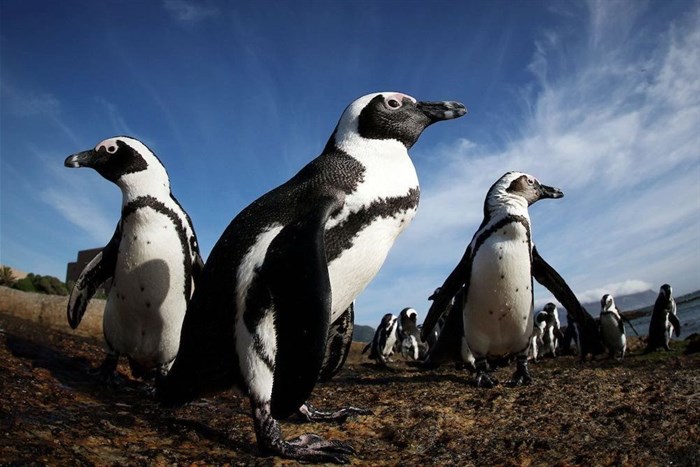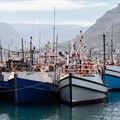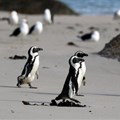Conservationists mount legal challenge to environment minister’s decision on fishing around breeding islands.

African penguins, photographed here in Simon’s Town, could be extinct as soon as 2035, according to BirdLife South Africa and Sanccob (Southern African Foundation for the Conservation of Coastal Birds). Photo: Dan Callister
- Bird conservation groups are mounting a legal challenge to Environment minister Barbara Creecy’s recent decision to maintain current closed fishing areas around crucial African penguin breeding islands for at least the next decade.
- The groups say these closures were supposed to be an interim measure and the minister’s decision is “entirely at odds” with the recommendations of an international panel of experts on how and where to determine the most effective new closed areas.
- At the current rate of decline, African penguins may be extinct in the wild as soon as 2035.
Environment minister Barbara Creecy’s recent decision to help save African penguins could ironically “sound the death knell” for this critically endangered seabird species which could become extinct as soon as 2035. This is according to two prominent South African bird conservation groups, argued in court papers filed last week.
Last Tuesday, BirdLife South Africa and Sanccob (Southern African Foundation for the Conservation of Coastal Birds), represented by the Biodiversity Law Centre, launched an urgent review and rescind application in the Pretoria High Court.
They are challenging Creecy’s August 2023 decision to confirm the ban on commercial fishing for anchovy and sardine – the penguins’ major food source – within previously designated “Interim Closure” areas around six major African penguin breeding colonies for at least the next 10 years.
The conservation groups are firmly in favour of closed fishing areas to promote penguin conservation, but have taken strong issue with how this policy is being implemented by Creecy.
They describe her decision as “arbitrary” and “biologically meaningless”, and contrary to recommendations by an international panel of experts she appointed two years ago.
The panel reviewed all scientific research relating to the extent to which the already struggling penguin population is being negatively impacted by the commercial pelagic fishing industry.

African penguins coming ashore. Photo: Dan Callister
There is no dispute about the current dire status of the African penguin that has now lost 97% of its historical population.
Endemic to South Africa and Namibia, there were historically perhaps as many as one million breeding pairs of African penguins. Last year, the species fell below 10,000 breeding pairs for the first time. A global survey concluded in December last year estimated the South African share of the population at 8,750 breeding pairs.
“If current trends persist, the species will be extinct in the wild by 2035,” the two applicants warn in their court papers.
They explain that an internationally ground-breaking Island Closure Experiment (ICE) was piloted and implemented by Creecy’s department between 2008 and 2021. This was designed to empirically test whether closed areas could reduce competition between the African penguin – a specialist feeder on anchovy and sardine – and the pelagic fishing industry targeting the same resource.
ICE started with a feasibility study between 2008 and 2014, followed by experimental closures to pelagic fishing within a radius of 20km of selected African penguin colonies, between 2015 and 2021.
The results of this experiment supported a policy of using targeted fishing closures to reduce competition for the pelagic fish resource, which in turn improved prey availability as a key contributor to penguin survival, the applicants say.
However, the ICE at best achieved an “uneasy” consensus between the fishing industry and the conservation sector and did not resolve the impasse.
So, in October 2022, Creecy appointed an international panel of experts to fully re-examine the scientific rationale for closing small-pelagic fishing grounds in the vicinity of African penguin breeding colonies in order to improve conservation of this species. It was the fourth investigation of its kind.
While the panel was reviewing the science, “Interim Closures” were imposed by Creecy’s department around six penguin breeding colonies: Dassen Island, Robben Island, Stony Point (Betty’s Bay), Dyer Island, and St. Croix Island and Bird Island in Algoa Bay.
In August 2023, the minister released the panel’s report and announced her final decision.
Dr Alistair McInnes, Seabird Conservation Manager at BirdLife South Africa, pointed out in his founding affidavit that the minister had accepted the importance of island closures as a conservation measure and imposed closures for a period of ten years until December 2033 (subject to review at the end of 2029) – both decisions in line with the panel’s findings and recommendations.
However, the panel had also recommended an appropriate method for delineating important penguin foraging habitat and had settled the issue of how to define a “valuable area for African penguins” when considering how to balance penguin needs with fishing industry interests. But Creecy appeared not to have taken these considerations into account, McInnes argued.
Crucially, the panel had recommended an appropriate “trade-off mechanism” to be used by the minister when deciding which particular closure delineation to impose around each specific penguin breeding colony. This mechanism allowed for a comparison of relative costs to industry and benefits to the penguins when the minister was considering primary closure proposals submitted by the conservation sector, industry and her department, McInnes explained.
However, Creecy had “inexplicably” re-imposed the old “Interim” closed areas. This was “entirely at odds” with the panel’s view on how to assess the most valuable African penguin conservation areas, he argued.
Wendell Roelf 17 Aug 2022 “The [panel’s] recommended trade-off mechanism accounted for the existing state of scientific and fisheries data to enable biologically meaningful closures to be imposed at the commencement of the monitoring period. It is this particular recommendation which has not been followed by the minister and which is central to the relief sought in these proceedings.”
“Predictably”, McInnes continued, no agreement to alter the interim closures had been reached between the fishing industry and the conservation sector by the December 2023 deadline. This meant that the interim closures were now “permanent” and would remain in place for the next decade.
“This sounds the death knell of the African penguin,” he stated.
Conservationists will be watching the unfolding litigation closely as it is the first of its kind in South Africa that invokes the minister’s constitutional obligation to prevent extinction of an endangered species.
Kate Handley, executive director of the Biodiversity Law Centre, described the review application as a “watershed” and a “potentially precedent-setting” case.
“It stands to give content to the South African government’s obligation to protect endangered species and, particularly in this instance, the African penguin. It also takes a stance on the role of science-led decision-making in ensuring that future generations have their environment, and the well-being of an endangered species, protected,” said Handley.
Creecy is the first respondent. The other respondents are two deputy directors-general in her department, the South African Pelagic Fishing Industry Association, and the Eastern Cape Pelagic Association.
Creecy’s department had not responded to a request for comment at the time of publishing.
This article was originally published on GroundUp.

































































